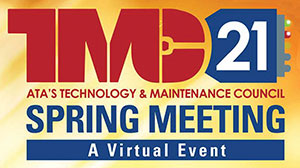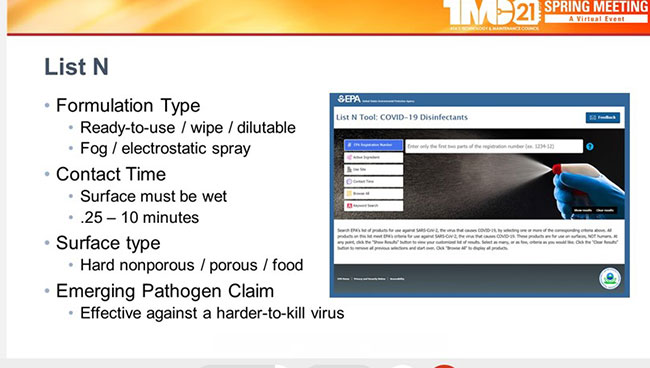Staff Reporter
TMC Study Group Offers Guidance to Help Fleets Maintain Clean Vehicles

[Ensure you have all the info you need in these unprecedented times. Subscribe now.]
A Technology & Maintenance Council study group presented best practices to fleets and transportation companies for ramping up cleaning to prevent the spread of COVID-19.
The Technology & Maintenance Council’s cab and controls study group said not all disinfectants are effective.
TMC, a division of American Trucking Associations, convened virtually April 20 for its annual spring conference.

Also at TMC 2021
Scott Harris, president of Environmental Quality Management Inc., an environmental consulting and construction company, identified claims that buyers such as transportation companies should beware of. He said the Environmental Protection Agency maintains lists of products that are effective against certain diseases, particularly List N. It refers to disinfectants meant for use against SARS-CoV-2.
Harris said some products display an EPA registration number, but do not appear on List N.
He also drew attention to the statement that a product “kills on contact,” explaining that contact times for solutions vary in the range from 15 seconds to 10 minutes.
“It does make a big difference,” Harris said. “If you’re trying to kill the virus in a hurry, then you’re going to want to find something on that list that works a lot faster. The contact time is not zero. Don’t be led to believe that as soon as you spray something on the surface, it’s done and the germs are dead.”
Companies should also be mindful of the types of products they are using to sanitize specific equipment, the speakers said. Kirk Altrichter, executive vice president of fleet services at Kenan Advantage Group, stressed the importance of diluting bleach with water, which he identified as an alternative to mild soap and water when cleaning switches and controls, the buckles on vehicle restraint systems and door handles. He warned companies to avoid using ammonia on these pieces of equipment. Based in North Canton, Ohio, Kenan Advantage Groups ranks No. 22 on the Transport Topics Top 100 list of the largest for-hire carriers in North America.
Harris cautioned fleets to look for disinfectants that do not damage touch screens and computer screens. He said scented wipes have ingredients that can be particularly harmful to screens. He recommended “natural attenuation” as a solution if companies have the luxury of leaving their cabs empty for a few days.
“Most of the mainstream disinfectants will do damage [to screens],” Harris said. “At least in a matter of days, that virus is going to be disabled and you won’t have to disinfect it at all.”

Jennifer Lincoln, co-director of the National Institute for Occupational Safety and Health’s Center for Maritime Safety and Health Studies, recommended employers become familiar with local health department resources and encourage employees to seek vaccination appointments in their communities if on-site vaccinations are not possible. NIOSH is part of the Centers for Disease Control and Prevention.
During her remarks, Lincoln presented a reverse pyramid depicting a hierarchy of controls to prevent the spread of COVID-19, the most effective of which is elimination, which removes or prevents entry of pathogens. Engineering controls, which isolate workers from the pathogen, and administrative controls, such as work policies and procedures that prevent exposure, appear next on the reverse pyramid. Personal protective equipment is the last step in the hierarchy.
Mental health needs should be considered in addition to physical health concerns, Lincoln noted. She urged employers to make resources about mental health and recognizing signs of stress available to employees.
“Mental health is an important component of worker safety and health,” Lincoln said.
Want more news? Listen to today's daily briefing below or go here for more info:




